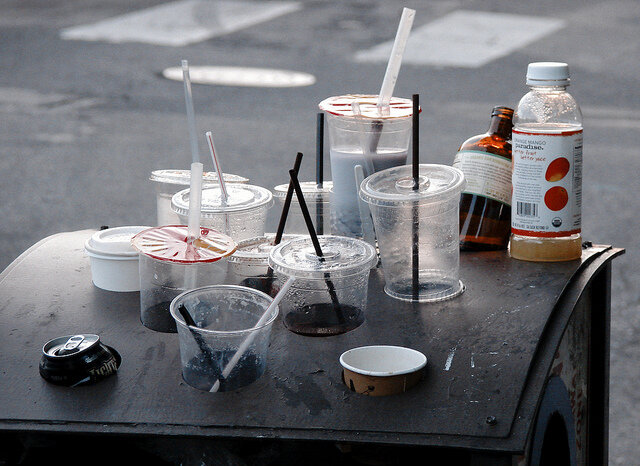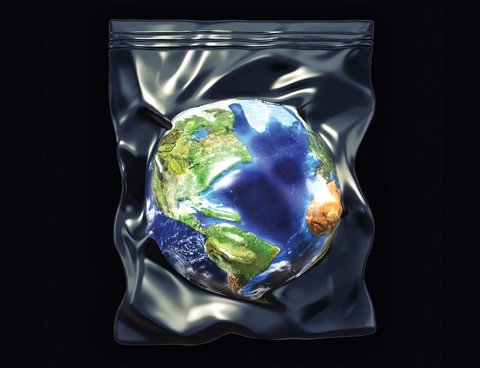Iran (IMNA) -The staggering amount of plastic produced each year is a major concern for our planet. With over 400 million tons of plastic being produced worldwide, it's alarming to think that half of this is meant to be used just once. Unfortunately, less than 10% of this plastic is recycled, which means that the majority of it ends up in our environment. Each year, an estimated 19–23 million tons of plastic find their way into our lakes, rivers, and oceans. This is equivalent to the combined weight of 2,200 Eiffel Towers.
The prevalence of microplastics in our environment is a growing concern, as their impact on human health and the ecosystem is not yet fully understood.
Studies have shown that these tiny particles can accumulate in the body, potentially causing harm to organs and tissues. In addition, microplastics can absorb and release harmful chemicals, leading to toxic effects. The sources of microplastics are numerous, including plastic waste from landfills and oceans, as well as products like cosmetics and clothing that contain synthetic fibers.
The urgency of the environmental crisis cannot be overstated. From the destruction of ecosystems to the extinction of species, we are facing a global emergency that requires immediate and sustained action. Fortunately, there are solutions available to us. Renewable energy sources like wind and solar power can help reduce our reliance on fossil fuels, while sustainable agriculture practices can help protect our soil and water resources. Governments must lead the way by implementing policies that incentivize these solutions and penalize environmentally harmful practices. Companies must also do their part by adopting sustainable business practices and investing in green technologies. But it's not just up to governments and companies - individuals can make a difference too by reducing their carbon footprint, recycling, and supporting environmentally responsible products and services.

The shift to a circular economy is a crucial step towards reducing the amount of plastic that enters our oceans. By 2040, this transition could lead to an 80 percent reduction in plastic waste, as well as a 55 percent decrease in virgin plastic production. This would not only benefit the environment but also save governments an estimated $70 billion by 2040. Additionally, the shift towards a circular economy could reduce greenhouse gas emissions by 25 percent, contributing to global efforts to combat climate change. Furthermore, this transition could create around 700,000 new jobs, primarily in developing countries where there is currently a high demand for employment opportunities. Overall, transitioning to a circular economy has the potential to bring about significant positive change for both people and the planet.
Plastic pollution in Iran
According to Mehdi Khadem-Sameni, an official with the Department of Environment, the nation produces about 185,000 tons of plastic annually. Since this material cannot be recycled or used as raw material by other industries, we must be very active in the area of collecting plastic waste and recycling it.
He said that in collaboration with other organizations like the Islamic Republic of Iran Broadcasting (IRIB), the Ministry of Agriculture, the Ministry of Interior, the Ministry of Industry, the Ministry of Education, and the National Standards Organization, the executive regulation on reducing the consumption of plastic bags was prepared, presented to the cabinet of ministers, and approved in October 2022.
The regulation was written in ten articles, he said, and stipulates that the Ministry of Industry create a five-year plan to replace thin plastic bags with a thickness of less than 25 microns, which account for 20 percent of annual production capacity, with biodegradable or environmentally friendly alternatives.
"The Ministry of Industry will prepare a guideline to reduce waste production and limit the production, distribution, and consumption of plastic bags in collaboration with the Ministry of Interior."
Khdem-Sameni continued by stating that it is important to enforce the restrictions on the free distribution of plastic bags, with the exception of those used at fruit stands, and the distribution of thin plastic bags with a thickness of less than 25 microns.

He emphasized that bags smaller than 25 microns are extremely thin and light, and depending on the kind of polymer and environmental factors, it can take anywhere between 300 and 900 years for them to break down and return to nature.
Microplastics are present in water sources, according to national and international research. Microplastics impact aquatic life, living things, and the environment significantly when they are present in the air, water, and soil.
"Several meetings are being held at the international level, and due to the environmental damage that plastics do to the environment and human health, international commitments have been made in the field of banning and limiting plastic production," he continued.
Researchers believe that the concentration of these pollutants in important sources is increasing, and in fact, the investigation and results of such research have led to the formation of the preliminary meetings of the plastic pollution working group. However, there are still no permissible limits for microplastic pollutants in water, soil, or air environments, as well as national or international standards.
President Ebrahim Raisi has emphasized the value of environmental conservation and stressed that environmental preservation comes before growth of any kind.
According to him, environmental protection will result in increased power, security, investment, and output across the nation.
In order to effectively safeguard the environment, both individuals and NGOs must be given the opportunity to do so, he continued.
Nature is in an emergency state as time runs out. To keep global warming at 1.5°C this century, yearly greenhouse gas emissions must be cut in half by 2030. Without movement, the risk of air pollution beyond acceptable levels would rise by half within a decade, and the amount of plastic garbage entering aquatic habitats would almost quadruple by 2040.


Your Comment